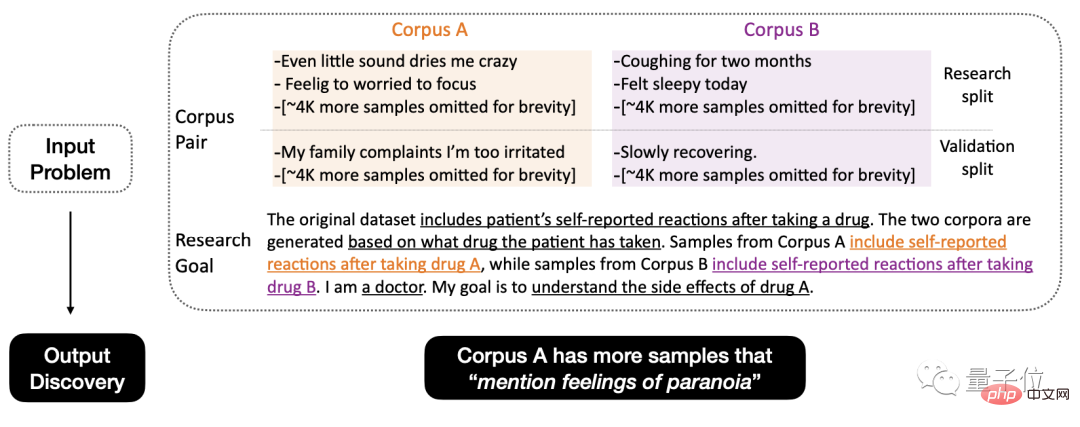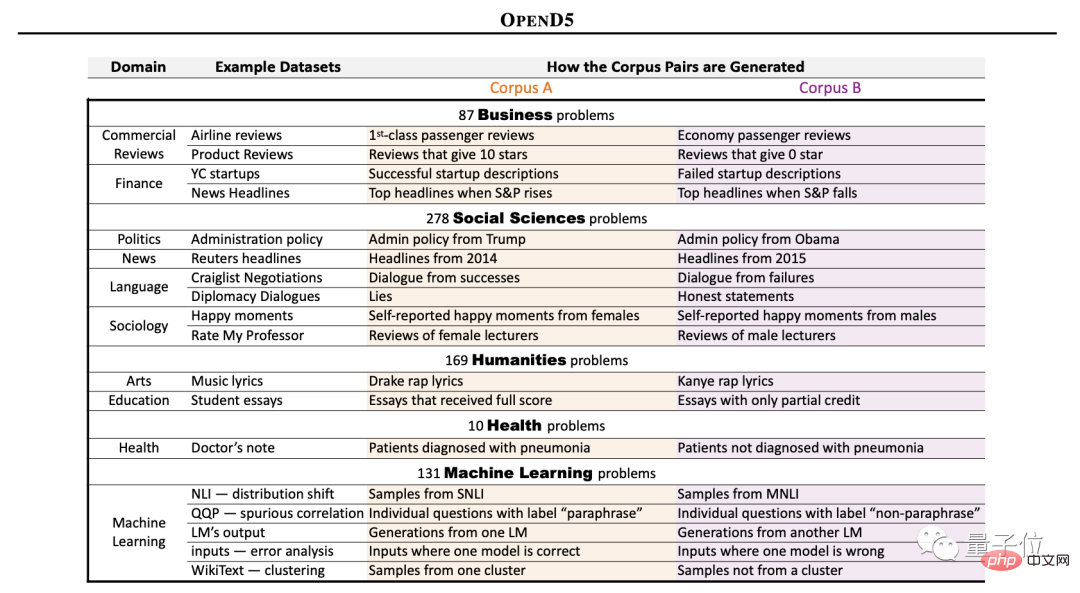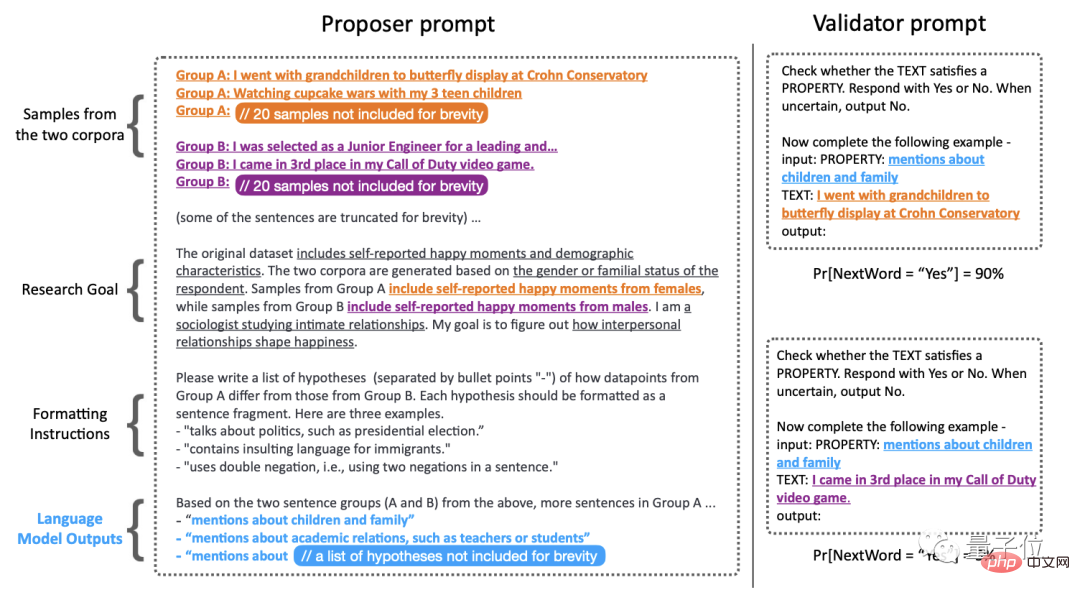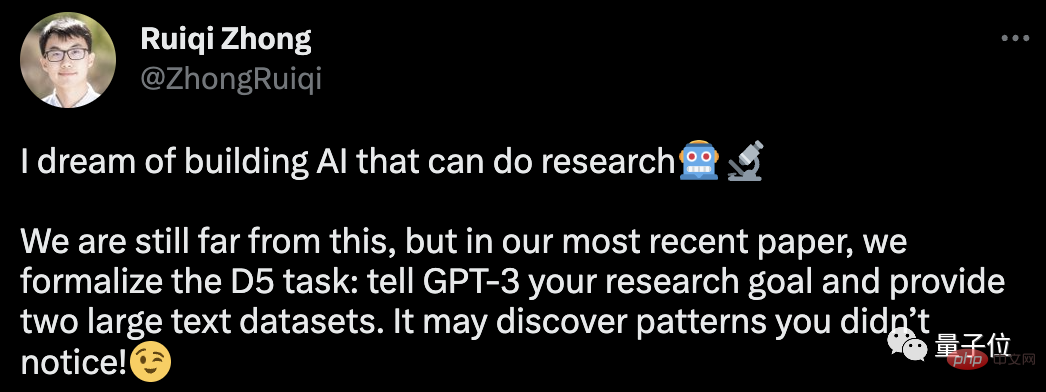A new approach to scientific research: let GPT-3 help you
This article is reprinted with the authorization of AI New Media Qubits (public account ID: QbitAI). Please contact the source for reprinting.
The latest posture of scientific research was unlocked by a Chinese guy——
Tell AI your research goals, then "feed" the data set into it, and you're done.
This is the latest research by Zhong Ruiqi, a doctoral student from Berkeley, and others. The tedious "evidence collection" process from massive data sets is all solved by GPT-3:

They also found that this method of using AI for scientific research is not only highly efficient, but can also produce "unexpected surprises" that humans have not thought of.
Let GPT-3 help you with scientific research
So why do the guys suddenly want to use this method to do scientific research?
This is because they found that in-depth mining of large corpora can indeed obtain some useful results, but if this process is done by humans, it is simply too time-consuming and laborious.
Therefore, they decided to hand over this tedious process to GPT-3 and named this task "D5":
Goal Driven Discovery of Distributional Differences via Language Descriptions.
Through language description, goal-driven discovery of distributed differences is achieved.
The process of the "D5" task is simply two actions:
- Input the research goal
- Input the two corpora

For example, in the above case, the little brother first input two corpora into the AI:
- Corpus A: Taking medicine Patient's reaction report after A
- Corpus B: Patient's reaction report after taking drug B
Then determine your research goals to the AI, that is, "I want to know about drug A side effects".
After the AI receives the task, it immediately begins to perform analysis work, and finally reaches its conclusion:
The samples in corpus A will be mentioned by more patients "paranoia".
But just imagine, if human researchers are allowed to do this work, it will take a lot of time just to understand corpora A and B, not to mention further comparative analysis and other work.
The reason why the D5 mission can be done so smoothly is because the guys have done a lot of work behind the scenes.
For example, the OpenD5 metadata set is constructed, which contains 675 open questions that meet the D5 tasks, covering fields such as business, social sciences, humanities, health, and machine learning.

And each open-ended question corresponds to a corpus pair (Corpus A and Corpus B), with an average of 17,000 samples.
The little brother also uses 50% of each corpus as the research part, and the other 50% is used for verification.
Based on this, I built a "D5 system". Its working principle is similar to that of humans obtaining findings from the database. It is divided into two stages, that is, creatively putting forward a hypothesis, and then analyzing the data in the database. This hypothesis is rigorously tested on the set.
According to this idea, the researchers next conducted an experiment using GPT-3.
They first showed GPT3 the research goals and some samples from each corpus, and then asked it to come up with a list of hypotheses.
The final experiment found that GPT-3 can use target descriptions to propose more relevant, novel, and meaningful hypotheses.

It is precisely because the OpenD5 data set covers so many fields that my brother said that their D5 system has a wide range of applications.
There are also some flaws
But regarding this D5 system, I also bluntly stated its flaws.
For example, if the corpus contains a lot of slang, colloquialisms, or words with emotions, then the "discoveries" given by AI will be biased.
In short, it means that AI has misunderstood and analyzed the vocabulary or description of a specific situation.

In addition, I also said that a more flexible corpus and a more scalable system are also the focus of their future research. .
But it seems that this research has made me very excited. After all, it is one step closer to his dream of "building a scientific research using AI manuscripts."

Reference link:
[1] https://www.php.cn/link/ b1adda14824f50ef24ff1c05bb66faf3
[2]https://www.php.cn/link/ec26fc2eb2b75aece19c70392dc744c2
The above is the detailed content of A new approach to scientific research: let GPT-3 help you. For more information, please follow other related articles on the PHP Chinese website!

Hot AI Tools

Undresser.AI Undress
AI-powered app for creating realistic nude photos

AI Clothes Remover
Online AI tool for removing clothes from photos.

Undress AI Tool
Undress images for free

Clothoff.io
AI clothes remover

Video Face Swap
Swap faces in any video effortlessly with our completely free AI face swap tool!

Hot Article

Hot Tools

Notepad++7.3.1
Easy-to-use and free code editor

SublimeText3 Chinese version
Chinese version, very easy to use

Zend Studio 13.0.1
Powerful PHP integrated development environment

Dreamweaver CS6
Visual web development tools

SublimeText3 Mac version
God-level code editing software (SublimeText3)

Hot Topics
 1387
1387
 52
52
 Use ddrescue to recover data on Linux
Mar 20, 2024 pm 01:37 PM
Use ddrescue to recover data on Linux
Mar 20, 2024 pm 01:37 PM
DDREASE is a tool for recovering data from file or block devices such as hard drives, SSDs, RAM disks, CDs, DVDs and USB storage devices. It copies data from one block device to another, leaving corrupted data blocks behind and moving only good data blocks. ddreasue is a powerful recovery tool that is fully automated as it does not require any interference during recovery operations. Additionally, thanks to the ddasue map file, it can be stopped and resumed at any time. Other key features of DDREASE are as follows: It does not overwrite recovered data but fills the gaps in case of iterative recovery. However, it can be truncated if the tool is instructed to do so explicitly. Recover data from multiple files or blocks to a single
 CUDA's universal matrix multiplication: from entry to proficiency!
Mar 25, 2024 pm 12:30 PM
CUDA's universal matrix multiplication: from entry to proficiency!
Mar 25, 2024 pm 12:30 PM
General Matrix Multiplication (GEMM) is a vital part of many applications and algorithms, and is also one of the important indicators for evaluating computer hardware performance. In-depth research and optimization of the implementation of GEMM can help us better understand high-performance computing and the relationship between software and hardware systems. In computer science, effective optimization of GEMM can increase computing speed and save resources, which is crucial to improving the overall performance of a computer system. An in-depth understanding of the working principle and optimization method of GEMM will help us better utilize the potential of modern computing hardware and provide more efficient solutions for various complex computing tasks. By optimizing the performance of GEMM
 Open source! Beyond ZoeDepth! DepthFM: Fast and accurate monocular depth estimation!
Apr 03, 2024 pm 12:04 PM
Open source! Beyond ZoeDepth! DepthFM: Fast and accurate monocular depth estimation!
Apr 03, 2024 pm 12:04 PM
0.What does this article do? We propose DepthFM: a versatile and fast state-of-the-art generative monocular depth estimation model. In addition to traditional depth estimation tasks, DepthFM also demonstrates state-of-the-art capabilities in downstream tasks such as depth inpainting. DepthFM is efficient and can synthesize depth maps within a few inference steps. Let’s read about this work together ~ 1. Paper information title: DepthFM: FastMonocularDepthEstimationwithFlowMatching Author: MingGui, JohannesS.Fischer, UlrichPrestel, PingchuanMa, Dmytr
 Huawei's Qiankun ADS3.0 intelligent driving system will be launched in August and will be launched on Xiangjie S9 for the first time
Jul 30, 2024 pm 02:17 PM
Huawei's Qiankun ADS3.0 intelligent driving system will be launched in August and will be launched on Xiangjie S9 for the first time
Jul 30, 2024 pm 02:17 PM
On July 29, at the roll-off ceremony of AITO Wenjie's 400,000th new car, Yu Chengdong, Huawei's Managing Director, Chairman of Terminal BG, and Chairman of Smart Car Solutions BU, attended and delivered a speech and announced that Wenjie series models will be launched this year In August, Huawei Qiankun ADS 3.0 version was launched, and it is planned to successively push upgrades from August to September. The Xiangjie S9, which will be released on August 6, will debut Huawei’s ADS3.0 intelligent driving system. With the assistance of lidar, Huawei Qiankun ADS3.0 version will greatly improve its intelligent driving capabilities, have end-to-end integrated capabilities, and adopt a new end-to-end architecture of GOD (general obstacle identification)/PDP (predictive decision-making and control) , providing the NCA function of smart driving from parking space to parking space, and upgrading CAS3.0
 Google is ecstatic: JAX performance surpasses Pytorch and TensorFlow! It may become the fastest choice for GPU inference training
Apr 01, 2024 pm 07:46 PM
Google is ecstatic: JAX performance surpasses Pytorch and TensorFlow! It may become the fastest choice for GPU inference training
Apr 01, 2024 pm 07:46 PM
The performance of JAX, promoted by Google, has surpassed that of Pytorch and TensorFlow in recent benchmark tests, ranking first in 7 indicators. And the test was not done on the TPU with the best JAX performance. Although among developers, Pytorch is still more popular than Tensorflow. But in the future, perhaps more large models will be trained and run based on the JAX platform. Models Recently, the Keras team benchmarked three backends (TensorFlow, JAX, PyTorch) with the native PyTorch implementation and Keras2 with TensorFlow. First, they select a set of mainstream
 Slow Cellular Data Internet Speeds on iPhone: Fixes
May 03, 2024 pm 09:01 PM
Slow Cellular Data Internet Speeds on iPhone: Fixes
May 03, 2024 pm 09:01 PM
Facing lag, slow mobile data connection on iPhone? Typically, the strength of cellular internet on your phone depends on several factors such as region, cellular network type, roaming type, etc. There are some things you can do to get a faster, more reliable cellular Internet connection. Fix 1 – Force Restart iPhone Sometimes, force restarting your device just resets a lot of things, including the cellular connection. Step 1 – Just press the volume up key once and release. Next, press the Volume Down key and release it again. Step 2 – The next part of the process is to hold the button on the right side. Let the iPhone finish restarting. Enable cellular data and check network speed. Check again Fix 2 – Change data mode While 5G offers better network speeds, it works better when the signal is weaker
 The vitality of super intelligence awakens! But with the arrival of self-updating AI, mothers no longer have to worry about data bottlenecks
Apr 29, 2024 pm 06:55 PM
The vitality of super intelligence awakens! But with the arrival of self-updating AI, mothers no longer have to worry about data bottlenecks
Apr 29, 2024 pm 06:55 PM
I cry to death. The world is madly building big models. The data on the Internet is not enough. It is not enough at all. The training model looks like "The Hunger Games", and AI researchers around the world are worrying about how to feed these data voracious eaters. This problem is particularly prominent in multi-modal tasks. At a time when nothing could be done, a start-up team from the Department of Renmin University of China used its own new model to become the first in China to make "model-generated data feed itself" a reality. Moreover, it is a two-pronged approach on the understanding side and the generation side. Both sides can generate high-quality, multi-modal new data and provide data feedback to the model itself. What is a model? Awaker 1.0, a large multi-modal model that just appeared on the Zhongguancun Forum. Who is the team? Sophon engine. Founded by Gao Yizhao, a doctoral student at Renmin University’s Hillhouse School of Artificial Intelligence.
 Tesla robots work in factories, Musk: The degree of freedom of hands will reach 22 this year!
May 06, 2024 pm 04:13 PM
Tesla robots work in factories, Musk: The degree of freedom of hands will reach 22 this year!
May 06, 2024 pm 04:13 PM
The latest video of Tesla's robot Optimus is released, and it can already work in the factory. At normal speed, it sorts batteries (Tesla's 4680 batteries) like this: The official also released what it looks like at 20x speed - on a small "workstation", picking and picking and picking: This time it is released One of the highlights of the video is that Optimus completes this work in the factory, completely autonomously, without human intervention throughout the process. And from the perspective of Optimus, it can also pick up and place the crooked battery, focusing on automatic error correction: Regarding Optimus's hand, NVIDIA scientist Jim Fan gave a high evaluation: Optimus's hand is the world's five-fingered robot. One of the most dexterous. Its hands are not only tactile




